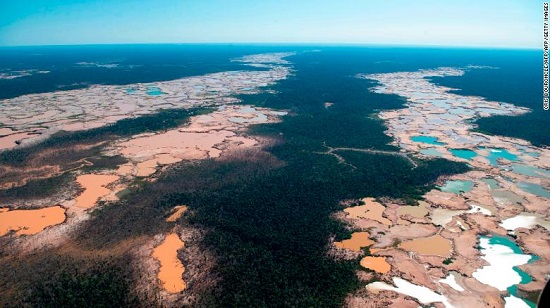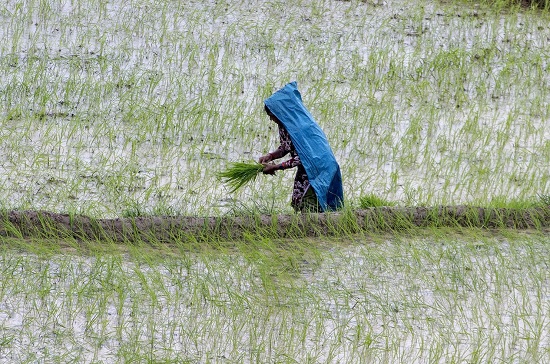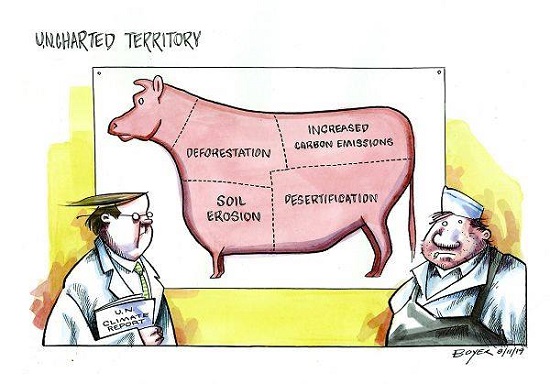

Humans have damaged around a quarter of ice-free land on Earth, United Nations scientists warned in a major report* Thursday, stressing that further degradation must be stopped to prevent catastrophic global warming.
The warning comes almost a year after the Intergovernmental Panel on Climate Change (IPCC)concluded in a landmark report that we only have until 2030 to drastically reduce our dependence on fossil fuels and prevent the planet from reaching the crucial threshold of 1.5 degrees Celsius above pre-industrial levels.
The second IPCC report highlights the vicious cycle of climate change and land degradation.
"We humans affect more than 70% of ice-free land, a quarter of this land is degraded. The way we produce food and what we eat contributes to the loss of natural ecosystems and declining biodiversity," said Valérie Masson-Delmotte, co-chair of the IPCC.
Change food production and stop abusing land, major climate report warns by Isabelle Gerretsen, World, CNN, Aug 8, 2019
*Climate Change and Land: An IPCC special report on climate change, desertification, land degradation, sustainable land management, food security, and greenhouse gas fluxes in terrestrial ecosystems

Feeding a planet inhabited by 10 billion people by mid-century — already a daunting task — is getting harder due to a little-known impact of global warming: the decline of essential nutrients in the world’s staple foods that exist in almost every single person’s diet around the world.
The mechanism by which rising carbon dioxide saps nutrients from our food crops remains somewhat unclear, but the effect is consistent across most plant types from trees to grasses to edible crops: It is reducing the availability of zinc, iron, protein and key vitamins in wheat, rice and several other fundamental grains and legumes.
The implications are huge: By 2050, hundreds of millions of people could slip below the minimum thresholds of these nutrients needed for good health, and more than 2 billion already deficient could see their conditions worsen. And it extends well beyond human nutrition as every animal in the biosphere depends, directly or indirectly, on plant consumption for nutrients.
These findings, which will appear this week as part of the most comprehensive review ever compiled on the two-way relationship between global warming and land use, highlight the urgent need to slash the greenhouse gas emissions that drive climate change. Human activity has increased atmospheric carbon more than 40 percent since the mid-19th century, enough to unleash a deadly onslaught of extreme weather made more destructive by rising seas. Without a drastic drop in emissions, those levels will climb even more quickly over the coming decades.
Climate change is sapping nutrients from our food — and it could become a global crisis, Opinion by Samuel Meyers*, Washington Post, Aug 5, 2019
*Samuel Myers is a principal research scientist at the Harvard T.H. Chan School of Public Health and director of the Planetary Health Alliance.
The El Niño of 2019 is officially done. Near-average conditions in the tropical Pacific indicate that we have returned to ENSO-neutral conditions (neither El Niño or La Niña is present). Forecasters continue to favor ENSO-neutral (50-55% chance) through the Northern Hemisphere winter.
August 2019 El Niño Update: Stick a fork in it by Nat Johnson, ENSO Blog, NOAA's Climate.gov, Aug 8, 2019
 Hat tip to the Stop Climate Science Denial Facebook page.
Hat tip to the Stop Climate Science Denial Facebook page.
[To be added.]

Posted by John Hartz on Sunday, 11 August, 2019
 |
The Skeptical Science website by Skeptical Science is licensed under a Creative Commons Attribution 3.0 Unported License. |